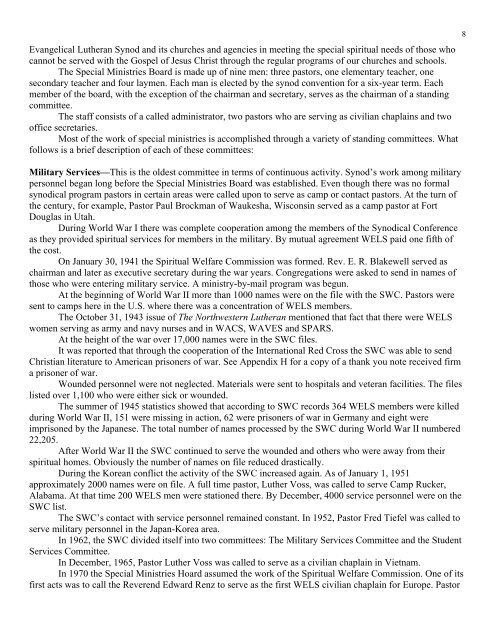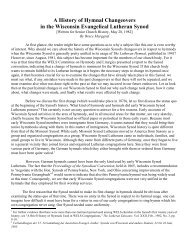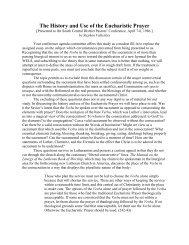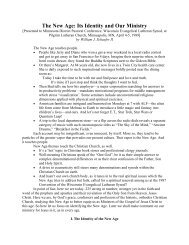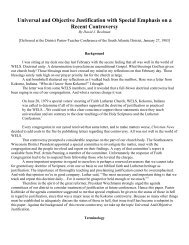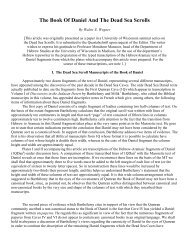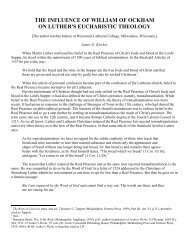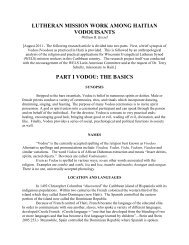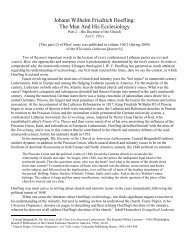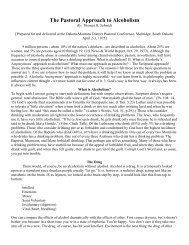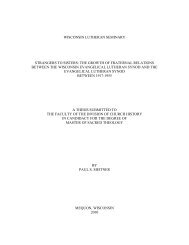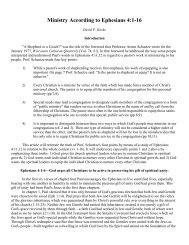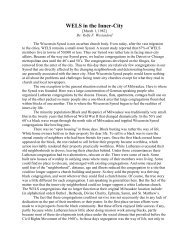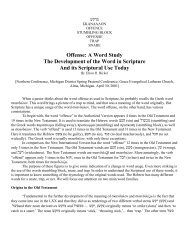A History of WELS Special Ministries - Wisconsin Lutheran Seminary ...
A History of WELS Special Ministries - Wisconsin Lutheran Seminary ...
A History of WELS Special Ministries - Wisconsin Lutheran Seminary ...
You also want an ePaper? Increase the reach of your titles
YUMPU automatically turns print PDFs into web optimized ePapers that Google loves.
Evangelical <strong>Lutheran</strong> Synod and its churches and agencies in meeting the special spiritual needs <strong>of</strong> those who<br />
cannot be served with the Gospel <strong>of</strong> Jesus Christ through the regular programs <strong>of</strong> our churches and schools.<br />
The <strong>Special</strong> <strong>Ministries</strong> Board is made up <strong>of</strong> nine men: three pastors, one elementary teacher, one<br />
secondary teacher and four laymen. Each man is elected by the synod convention for a six-year term. Each<br />
member <strong>of</strong> the board, with the exception <strong>of</strong> the chairman and secretary, serves as the chairman <strong>of</strong> a standing<br />
committee.<br />
The staff consists <strong>of</strong> a called administrator, two pastors who are serving as civilian chaplains and two<br />
<strong>of</strong>fice secretaries.<br />
Most <strong>of</strong> the work <strong>of</strong> special ministries is accomplished through a variety <strong>of</strong> standing committees. What<br />
follows is a brief description <strong>of</strong> each <strong>of</strong> these committees:<br />
Military Services—This is the oldest committee in terms <strong>of</strong> continuous activity. Synod’s work among military<br />
personnel began long before the <strong>Special</strong> <strong>Ministries</strong> Board was established. Even though there was no formal<br />
synodical program pastors in certain areas were called upon to serve as camp or contact pastors. At the turn <strong>of</strong><br />
the century, for example, Pastor Paul Brockman <strong>of</strong> Waukesha, <strong>Wisconsin</strong> served as a camp pastor at Fort<br />
Douglas in Utah.<br />
During World War I there was complete cooperation among the members <strong>of</strong> the Synodical Conference<br />
as they provided spiritual services for members in the military. By mutual agreement <strong>WELS</strong> paid one fifth <strong>of</strong><br />
the cost.<br />
On January 30, 1941 the Spiritual Welfare Commission was formed. Rev. E. R. Blakewell served as<br />
chairman and later as executive secretary during the war years. Congregations were asked to send in names <strong>of</strong><br />
those who were entering military service. A ministry-by-mail program was begun.<br />
At the beginning <strong>of</strong> World War II more than 1000 names were on the file with the SWC. Pastors were<br />
sent to camps here in the U.S. where there was a concentration <strong>of</strong> <strong>WELS</strong> members.<br />
The October 31, 1943 issue <strong>of</strong> The Northwestern <strong>Lutheran</strong> mentioned that fact that there were <strong>WELS</strong><br />
women serving as army and navy nurses and in WACS, WAVES and SPARS.<br />
At the height <strong>of</strong> the war over 17,000 names were in the SWC files.<br />
It was reported that through the cooperation <strong>of</strong> the International Red Cross the SWC was able to send<br />
Christian literature to American prisoners <strong>of</strong> war. See Appendix H for a copy <strong>of</strong> a thank you note received firm<br />
a prisoner <strong>of</strong> war.<br />
Wounded personnel were not neglected. Materials were sent to hospitals and veteran facilities. The files<br />
listed over 1,100 who were either sick or wounded.<br />
The summer <strong>of</strong> 1945 statistics showed that according to SWC records 364 <strong>WELS</strong> members were killed<br />
during World War II, 151 were missing in action, 62 were prisoners <strong>of</strong> war in Germany and eight were<br />
imprisoned by the Japanese. The total number <strong>of</strong> names processed by the SWC during World War II numbered<br />
22,205.<br />
After World War II the SWC continued to serve the wounded and others who were away from their<br />
spiritual homes. Obviously the number <strong>of</strong> names on file reduced drastically.<br />
During the Korean conflict the activity <strong>of</strong> the SWC increased again. As <strong>of</strong> January 1, 1951<br />
approximately 2000 names were on file. A full time pastor, Luther Voss, was called to serve Camp Rucker,<br />
Alabama. At that time 200 <strong>WELS</strong> men were stationed there. By December, 4000 service personnel were on the<br />
SWC list.<br />
The SWC’s contact with service personnel remained constant. In 1952, Pastor Fred Tiefel was called to<br />
serve military personnel in the Japan-Korea area.<br />
In 1962, the SWC divided itself into two committees: The Military Services Committee and the Student<br />
Services Committee.<br />
In December, 1965, Pastor Luther Voss was called to serve as a civilian chaplain in Vietnam.<br />
In 1970 the <strong>Special</strong> <strong>Ministries</strong> Hoard assumed the work <strong>of</strong> the Spiritual Welfare Commission. One <strong>of</strong> its<br />
first acts was to call the Reverend Edward Renz to serve as the first <strong>WELS</strong> civilian chaplain for Europe. Pastor<br />
8


